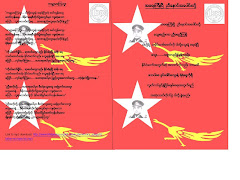The Associated Press
Published: May 18, 2008
MANILA, Philippines: Myanmar, long a thorn in the side of its Southeast Asian allies, has again made them a target of criticism after its ruling junta shocked the world by blocking most foreign aid for desperate cyclone survivors.
Critics have accused the Association of Southeast Asian Nations, a 10-country bloc that includes Myanmar, of doing little to persuade the reclusive country's military-led government to rapidly let in outside help — particularly disaster experts.
European Union nations have warned that the junta could be committing a crime against humanity by blocking aid intended for up to 2.5 million survivors grappling with hunger, loss of their homes and potential outbreaks of deadly diseases.
"More than any international organization, it's ASEAN which can do something, but it has shown no teeth," said Loretta Ann Rosales, a former Filipino legislator who is an adviser to a Southeast Asian lawmakers' group advocating democracy in Myanmar.
"If they cannot take a strong position in this emergency, they can dissolve themselves into irrelevance."
ASEAN did manage to schedule an emergency meeting of its foreign ministers Monday in Singapore, the bloc's current chairman country, to discuss the disaster — but only after getting the junta's nod, a Southeast Asian diplomat in Manila told The Associated Press on condition of anonymity due to the sensitive nature of the issue.
ASEAN Secretary-General Surin Pitsuwan will give a rundown of the group's efforts to help in the cyclone's aftermath. Myanmar's top diplomat, Nyan Win, will present a "needs assessment" to fellow ministers, said Philippine Assistant Foreign Secretary Marilyn Alarilla.
A proposal for ASEAN to play a role in arranging the entry of aid for Myanmar may be considered, she said, while suggestions that aid be taken in by force were unlikely to gain support.
"ASEAN moves gradually and by consensus," she said. "If Myanmar takes a hard-line position, we won't be effective."
It is the latest storm blamed on Myanmar to batter ASEAN, a Cold War-era bloc of fledgling democracies, authoritarian states, a military dictatorship and a monarchy. It has long been hamstrung by that diversity, along with a bedrock rule of noninterference in each other's affairs and a policy of making decision by consensus.
ASEAN, founded in 1967, takes pride in banding together such diverse countries, creating a platform to resolve conflicts and now integrating their economies as a counterweight to regional powerhouses China and India.
But Myanmar's junta, targeted by the West for its dismal human rights record and misrule, has been the perennial black sheep.
ASEAN has constantly nudged Myanmar to rapidly move toward democracy and free political prisoners, including democracy icon Aung San Suu Kyi — a futile call that has often dominated the annual summits of the group's heads of state.
In 2006, Myanmar was forced to give up its turn in ASEAN's rotating chairmanship due to fears of a Western boycott of all of the group's meetings. A year later, the junta violently cracked down on the biggest pro-democracy demonstrations Myanmar had seen in almost two decades, killing at least 31 people according to a U.N. estimate and detaining thousands. ASEAN leaders condemned the crackdown.
In the aftermath of the May 2-3 cyclone, ASEAN's influence on Myanmar has again been put to a test. With its options shackled by its noninterference policy, analysts say it is unlikely to take any stronger steps beyond voicing its concern over problems hampering the flow of aid.
"They can't force the junta to do anything. The only thing they can do is to act as a conduit between Myanmar and the West to facilitate the entry of foreign aid," said James Chin, a political science professor with Malaysia's Monash University. "It's the most practical thing ASEAN can do and the thing most acceptable to the Myanmar leadership."
China, a huge provider of aid and military equipment to Myanmar, has been too hobbled by a devastating earthquake for it to get fully involved in the situation and is likely to stay away from any controversy ahead of the Beijing Olympics.
That leaves ASEAN among the few to deal with Myanmar. Its limited influence is underscored by the inability of most of its aid workers, including a token 15-man Philippine medical contingent, to obtain visas to go in.
____
Associated Press Writer Eileen Ng contributed to this report from Kuala Lumpur, Malaysia.
Sunday, May 18, 2008
Myanmar's mishandling of cyclone disaster deals latest blow to ASEAN
Posted by
54freedom
at
10:11 AM
![]()
Labels: Myanmar's mishandling of cyclone disaster deals latest blow to ASEAN
Subscribe to:
Post Comments (Atom)













No comments:
Post a Comment